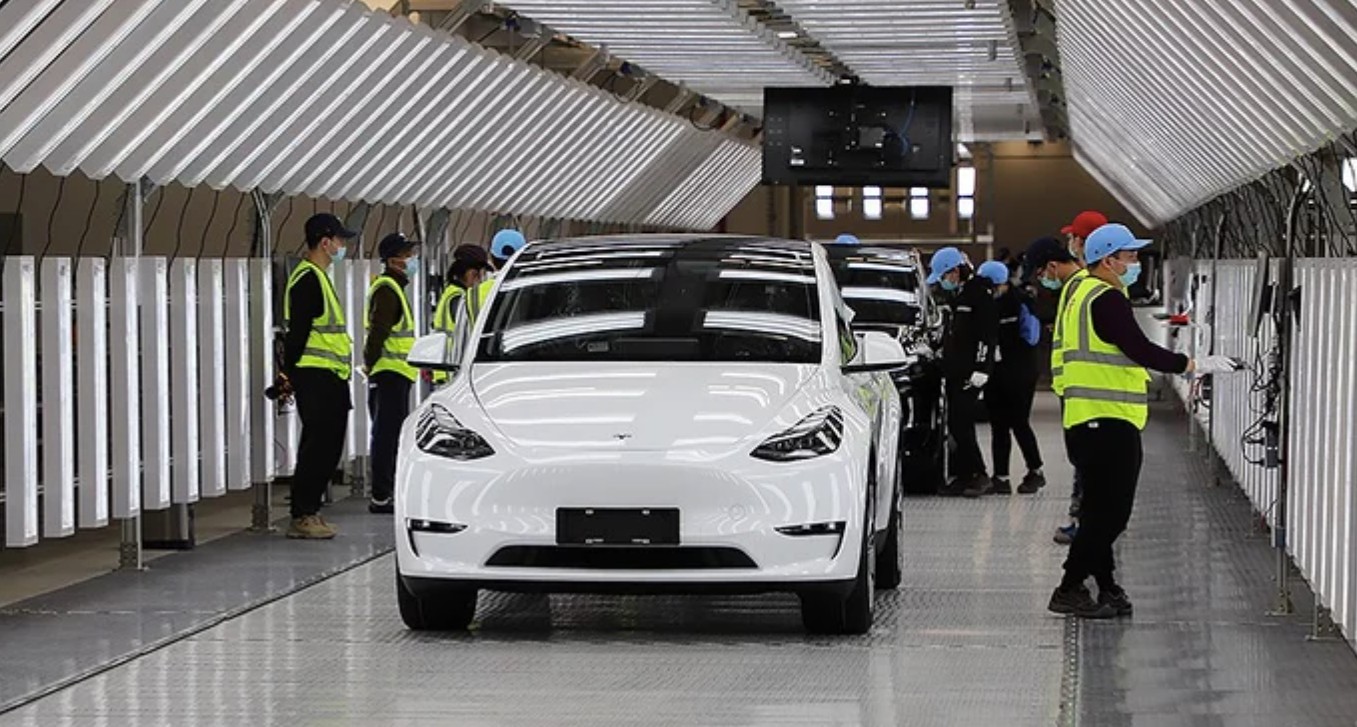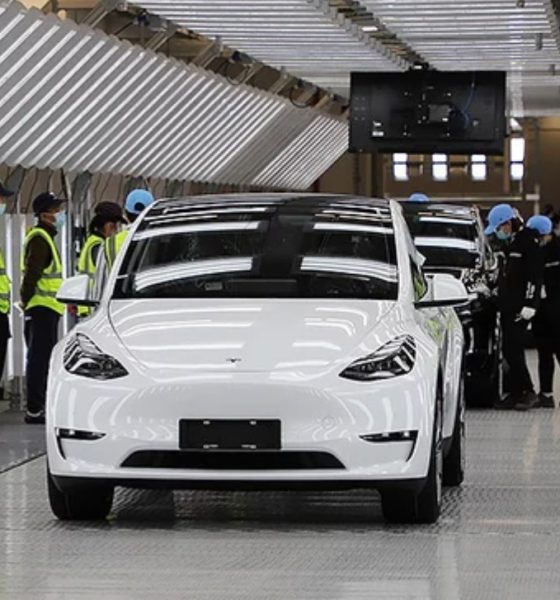

Investor's Corner
Tesla’s market disruption may lead to healthy slice of global auto market: Mizuho
Tesla (NASDAQ: TSLA) is expected to control 10% of the global automotive market in the coming years, analysts from Tokyo-based Mizuho Bank said in a recent note to investors. Tesla’s disruption of the global automotive market through its high-tech and affordable electric vehicles could ultimately lead to the company producing 1-out-of-10 cars on the road in the coming years.
Over the past few years, the transition to electrification in passenger vehicles has accelerated greatly, mostly due to Tesla’s mainstream success as an automaker. The company’s influence on the global automotive market has been identified as disruptive and has caused OEMs like GM, Ford, and others to consider rolling out new electrified models, a plan that has culminated in some of the largest car companies in the world to change their long-term supply chain plans. Instead of focusing on purchasing combustion engines, these legacy automotive companies are opting for battery cells instead, making lofty but sufficient manufacturing goals that hint toward a future of fully electrified fleets.
Tesla has captured a considerable portion of the battery electric vehicle (BEV) market over the past four years, mostly due to its introduction of mass-market EVs that are affordable and land around the price point of an average new car in 2021, according to Kelley Blue Book. While Tesla has raised prices on many of its models over the past several months as the company, among others, combats a global shortage of semiconductors and other critical parts of an EV’s DNA, Tesla still holds the reputation for the most advanced electric vehicles on the market at the most competitive prices. For the performance, range, and software that owners receive with Teslas, there isn’t a much better bang for your buck.
Analysts at Mizuho Bank agree, according to a note that the firm sent to investors. While Mizuho analyst Vijay Rakesh identifies the growing global EV market and Tesla’s domination of it, he is aware of incoming competitors. Not signaling that Tesla will encounter tremendous disruption from competitors, new or old, Rakesh’s money would likely be on Tesla if this were a betting situation.
The analyst wrote (via Seeking Alpha):
“Total BEV penetration is at 7.4% in Europe and 6.8% in China, while the U.S. lags at 1.9%. The up and comers still face challenges with VW sales lagging, while GM appears to be getting traction from its ~ $4K HongGuang Mini EV in China.”
Tesla held around 24% of the global BEV market in Q1, mostly due to impressive sales figures of the Model 3 and Model Y combined with Tesla’s continuing trend of Quarter-over-Quarter growth. While this is impressive, the real disruption will occur when Tesla starts to take a substantial slice of the overall automotive market. Rakesh believes the company could achieve up to 10% of the global automotive market, taking more gas-powered engines off the road than many could imagine.
Mizuho is bullish on the idea that TSLA could gain further traction in the EV market by leaving behind legacy companies and newcomers to the BEV sector due to its overwhelming lead in battery tech and autonomous driving developments. The company’s considerable lead in both of these categories makes it a prime candidate to begin even more disruption of the global automotive market. Mizuho believes Tesla could achieve at least 10% of the total market share in the coming years.
Rakesh is ranked 93 out of 7,551 analysts on TipRanks and holds a five-star rating with an average return of 26.3% and a success rate of 69%. He holds Tesla with an $820.00 price target and a “Buy” rating for the stock.
Disclosure: Joey Klender is a TSLA Shareholder.

Elon Musk
Tesla stock gets latest synopsis from Jim Cramer: ‘It’s actually a robotics company’
“Turns out it’s actually a robotics and Cybercab company, and I want to buy, buy, buy. Yes, Tesla’s the paper that turned into scissors in one session,” Cramer said.

Tesla stock (NASDAQ: TSLA) got its latest synopsis from Wall Street analyst Jim Cramer, who finally realized something that many fans of the company have known all along: it’s not a car company. Instead, it’s a robotics company.
In a recent note that was released after Tesla reported Earnings in late January, Cramer seemed to recognize that the underwhelming financials and overall performance of the automotive division were not representative of the current state of affairs.
Instead, we’re seeing a company transition itself away from its early identity, essentially evolving like a caterpillar into a butterfly.
The narrative of the Earnings Call was simple: We’re not a car company, at least not from a birds-eye view. We’re an AI and Robotics company, and we are transitioning to this quicker than most people realize.
Tesla stock gets another analysis from Jim Cramer, and investors will like it
Tesla’s Q4 Earnings Call featured plenty of analysis from CEO Elon Musk and others, and some of the more minor details of the call were even indicative of a company that is moving toward AI instead of its cars. For example, the Model S and Model X will be no more after Q2, as Musk said that they serve relatively no purpose for the future.
Instead, Tesla is shifting its focus to the vehicles catered for autonomy and its Robotaxi and self-driving efforts.
Cramer recognizes this:
“…we got results from Tesla, which actually beat numbers, but nobody cares about the numbers here, as electric vehicles are the past. And according to CEO Elon Musk, the future of this company comes down to Cybercabs and humanoid robots. Stock fell more than 3% the next day. That may be because their capital expenditures budget was higher than expected, or maybe people wanted more details from the new businesses. At this point, I think Musk acolytes might be more excited about SpaceX, which is planning to come public later this year.”
He continued, highlighting the company’s true transition away from vehicles to its Cybercab, Optimus, and AI ambitions:
“I know it’s hard to believe how quickly this market can change its attitude. Last night, I heard a disastrous car company speak. Turns out it’s actually a robotics and Cybercab company, and I want to buy, buy, buy. Yes, Tesla’s the paper that turned into scissors in one session. I didn’t like it as a car company. Boy, I love it as a Cybercab and humanoid robot juggernaut. Call me a buyer and give me five robots while I’m at it.”
Cramer’s narrative seems to fit that of the most bullish Tesla investors. Anyone who is labeled a “permabull” has been echoing a similar sentiment over the past several years: Tesla is not a car company any longer.
Instead, the true focus is on the future and the potential that AI and Robotics bring to the company. It is truly difficult to put Tesla shares in the same group as companies like Ford, General Motors, and others.
Tesla shares are down less than half a percent at the time of publishing, trading at $423.69.
Elon Musk
Tesla to a $100T market cap? Elon Musk’s response may shock you

There are a lot of Tesla bulls out there who have astronomical expectations for the company, especially as its arm of reach has gone well past automotive and energy and entered artificial intelligence and robotics.
However, some of the most bullish Tesla investors believe the company could become worth $100 trillion, and CEO Elon Musk does not believe that number is completely out of the question, even if it sounds almost ridiculous.
To put that number into perspective, the top ten most valuable companies in the world — NVIDIA, Apple, Alphabet, Microsoft, Amazon, TSMC, Meta, Saudi Aramco, Broadcom, and Tesla — are worth roughly $26 trillion.
Will Tesla join the fold? Predicting a triple merger with SpaceX and xAI
Cathie Wood of ARK Invest believes the number is reasonable considering Tesla’s long-reaching industry ambitions:
“…in the world of AI, what do you have to have to win? You have to have proprietary data, and think about all the proprietary data he has, different kinds of proprietary data. Tesla, the language of the road; Neuralink, multiomics data; nobody else has that data. X, nobody else has that data either. I could see $100 trillion. I think it’s going to happen because of convergence. I think Tesla is the leading candidate [for $100 trillion] for the reason I just said.”
Musk said late last year that all of his companies seem to be “heading toward convergence,” and it’s started to come to fruition. Tesla invested in xAI, as revealed in its Q4 Earnings Shareholder Deck, and SpaceX recently acquired xAI, marking the first step in the potential for a massive umbrella of companies under Musk’s watch.
SpaceX officially acquires xAI, merging rockets with AI expertise
Now that it is happening, it seems Musk is even more enthusiastic about a massive valuation that would swell to nearly four-times the value of the top ten most valuable companies in the world currently, as he said on X, the idea of a $100 trillion valuation is “not impossible.”
It’s not impossible
— Elon Musk (@elonmusk) February 6, 2026
Tesla is not just a car company. With its many projects, including the launch of Robotaxi, the progress of the Optimus robot, and its AI ambitions, it has the potential to continue gaining value at an accelerating rate.
Musk’s comments show his confidence in Tesla’s numerous projects, especially as some begin to mature and some head toward their initial stages.
Elon Musk
Tesla director pay lawsuit sees lawyer fees slashed by $100 million
The ruling leaves the case’s underlying settlement intact while significantly reducing what the plaintiffs’ attorneys will receive.

The Delaware Supreme Court has cut more than $100 million from a legal fee award tied to a shareholder lawsuit challenging compensation paid to Tesla directors between 2017 and 2020.
The ruling leaves the case’s underlying settlement intact while significantly reducing what the plaintiffs’ attorneys will receive.
Delaware Supreme Court trims legal fees
As noted in a Bloomberg Law report, the case targeted pay granted to Tesla directors, including CEO Elon Musk, Oracle founder Larry Ellison, Kimbal Musk, and Rupert Murdoch. The Delaware Chancery Court had awarded $176 million to the plaintiffs. Tesla’s board must also return stock options and forego years worth of pay.
As per Chief Justice Collins J. Seitz Jr. in an opinion for the Delaware Supreme Court’s full five-member panel, however, the decision of the Delaware Chancery Court to award $176 million to a pension fund’s law firm “erred by including in its financial benefit analysis the intrinsic value” of options being returned by Tesla’s board.
The justices then reduced the fee award from $176 million to $70.9 million. “As we measure it, $71 million reflects a reasonable fee for counsel’s efforts and does not result in a windfall,” Chief Justice Seitz wrote.
Other settlement terms still intact
The Supreme Court upheld the settlement itself, which requires Tesla’s board to return stock and options valued at up to $735 million and to forgo three years of additional compensation worth about $184 million.
Tesla argued during oral arguments that a fee award closer to $70 million would be appropriate. Interestingly enough, back in October, Justice Karen L. Valihura noted that the $176 award was $60 million more than the Delaware judiciary’s budget from the previous year. This was quite interesting as the case was “settled midstream.”
The lawsuit was brought by a pension fund on behalf of Tesla shareholders and focused exclusively on director pay during the 2017–2020 period. The case is separate from other high-profile compensation disputes involving Elon Musk.








